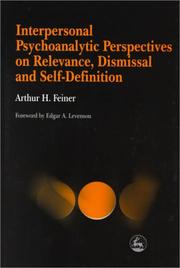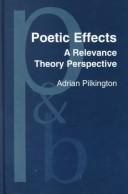| Listing 1 - 10 of 33 | << page >> |
Sort by
|
Book
ISBN: 1443891681 9781443891684 1443872806 9781443872805 Year: 2017 Publisher: Newcastle upon Tyne, England : Cambridge Scholars Publishing,
Abstract | Keywords | Export | Availability | Bookmark
 Loading...
Loading...Choose an application
- Reference Manager
- EndNote
- RefWorks (Direct export to RefWorks)
Relevance. --- Pertinence --- Relevancy --- Meaning (Philosophy) --- Meaning (Psychology)
Book
ISBN: 0416820204 0416820107 9780416820102 9780416820201 Year: 1975 Publisher: London Methuen
Abstract | Keywords | Export | Availability | Bookmark
 Loading...
Loading...Choose an application
- Reference Manager
- EndNote
- RefWorks (Direct export to RefWorks)
Social psychology --- Relevance --- Mass psychology --- Psychology, Social --- Human ecology --- Psychology --- Social groups --- Sociology --- Pertinence --- Relevancy --- Meaning (Philosophy) --- Meaning (Psychology)
Book
ISBN: 9789027252838 9789027213730 9027213739 9027213739 9027252831 Year: 2023 Publisher: Amsterdam John Benjamins Publishing Company
Abstract | Keywords | Export | Availability | Bookmark
 Loading...
Loading...Choose an application
- Reference Manager
- EndNote
- RefWorks (Direct export to RefWorks)
"This book offers a fresh take on several long-standing issues relating to the (non-)truth-conditional interpretation of epistemic, evidential, hearsay and epistemic sentence adverbials. Drawing on a wealth of data from English and German, it shows for the first time that all four adverbial classes can have both truth-conditional and non-truth-conditional (parenthetical) readings. A novel account is presented according to which (non-)truth-conditional readings may arise at either the syntactic or the pragmatic level. Drawing on relevance theory, the book also re-examines the explicature and illocutionary status of the adverbial qualification and the qualified proposition, and refines the notions of pointhood and at-issueness to provide an original information-structural analysis applicable to not just sentence adverbials but a range of other propositional qualifiers. Finally, the investigation identifies five factors affecting (non-)truth-conditional interpretation: linear position, prosody, the semantics of the adverbial, its information-structural properties and the wider context. The book will be of interest to those interested in relevance theory, the semantics/pragmatics interface, the syntax/pragmatics interface and information structure, as well as for syntacticians, semanticists and pragmatists interested in sentence adverbials, other propositional qualifiers and parentheticality, syntactic and interpretational"--
Grammar, Comparative and general --- Relevance. --- Adverbials. --- Sentences. --- Conditionals --- Pertinence --- Relevancy --- Meaning (Philosophy) --- Meaning (Psychology) --- Linguistics --- Philology --- Grammar --- Relevance --- Adverbials --- Sentences
Book
ISBN: 0190845244 9780190845247 9780190845230 9780190845254 0190845260 0190845252 0190845236 Year: 2020 Publisher: New York, N.Y. Oxford University Press
Abstract | Keywords | Export | Availability | Bookmark
 Loading...
Loading...Choose an application
- Reference Manager
- EndNote
- RefWorks (Direct export to RefWorks)
Successful communication requires optimal relevance to a target audience. Relevance theory (RT) provides an excellent model based on this insight, but the impact of the theory has until now been restricted due to an almost exclusive focus on spoken face-to-face communication. 'Visual and Multimodal Communication' systematically demonstrates how RT can fulfill its promise to develop into an inclusive theory of communication. In this text, Charles Forceville refines and adapts RT's original claims to show its applicability to static visuals and multimodal discourses in popular culture genres. Using colourful examples, he explains how RT can be expanded and adapted to accommodate mass-communicative visual and visual-plus-verbal messages.
Visual communication. --- Relevance. --- Pertinence --- Relevancy --- Meaning (Philosophy) --- Meaning (Psychology) --- Graphic communication --- Imaginal communication --- Pictorial communication --- Communication --- Visual communication --- Relevance --- E-books --- Mass communications

ISBN: 128053799X 9786610537990 1846421985 1417549793 9781417549795 9781846421983 9781280537998 1853028649 6610537992 Year: 2000 Publisher: London Philadelphia J. Kingsley Publishers
Abstract | Keywords | Export | Availability | Bookmark
 Loading...
Loading...Choose an application
- Reference Manager
- EndNote
- RefWorks (Direct export to RefWorks)
Most books on psychoanalysis, its theory or its process, are packed with abstract, esoteric lingo that's fars away from how people feel or express themselves. This one is different in that it's of the "she-said" variety, and at the same time presents a pot full of insight about patients that really rings true.
Psychoanalysis. --- Relevance. --- Self-perception. --- Self-concept --- Self image --- Self-understanding --- Perception --- Self-discrepancy theory --- Self-evaluation --- Pertinence --- Relevancy --- Meaning (Philosophy) --- Meaning (Psychology) --- Psychology --- Psychology, Pathological
Book
ISBN: 1282692410 9786612692413 1443821926 9781443821926 9781443821292 1443821292 9781282692411 6612692413 Year: 2010 Publisher: Newcastle Cambridge Scholars
Abstract | Keywords | Export | Availability | Bookmark
 Loading...
Loading...Choose an application
- Reference Manager
- EndNote
- RefWorks (Direct export to RefWorks)
The present volume demonstrates the multifaceted potential of Relevance Theory, which, for more than two decades now, has been inspiring studies of the relationship between human communication and cognition. In the Mind and across Minds reflects the main strands of relevance-theoretic research, by expanding, evaluating and revising the researchers' ideas in a collection of papers by an international array of scholars. The papers explore various aspects of communication including such issues a...
Language and languages. --- Interpersonal communication. --- Cognition. --- Relevance. --- Foreign languages --- Languages --- Anthropology --- Communication --- Ethnology --- Information theory --- Meaning (Psychology) --- Philology --- Linguistics --- Pertinence --- Relevancy --- Meaning (Philosophy) --- Psychology --- Interpersonal relations
Book
ISBN: 1443845760 9781443845762 9781443840194 144384019X Year: 2012 Publisher: Newcastle upon Tyne Cambridge Scholars Publishing
Abstract | Keywords | Export | Availability | Bookmark
 Loading...
Loading...Choose an application
- Reference Manager
- EndNote
- RefWorks (Direct export to RefWorks)
The present volume covers a variety of topics which are at the centre of interest in pragmatic research: understanding and believing, reference, politeness, communication problems, stylistics, metaphor, and humour. Next to innovative theoretical proposals, there are interesting analyses and discussions.
Relevance. --- Pragmatics. --- Pragmalinguistics --- General semantics --- Language and languages --- Logic, Symbolic and mathematical --- Semantics (Philosophy) --- Pertinence --- Relevancy --- Meaning (Philosophy) --- Meaning (Psychology) --- Philosophy --- Pragmatics --- Psycholinguistics

ISBN: 9027250901 1556199228 902725091X 1556199236 1282163183 9786612163180 902729898X 9789027298980 9781282163188 9781556199226 9781556199233 9789027250902 9789027250919 6612163186 Year: 2000 Volume: 75 Publisher: Amsterdam Benjamins
Abstract | Keywords | Export | Availability | Bookmark
 Loading...
Loading...Choose an application
- Reference Manager
- EndNote
- RefWorks (Direct export to RefWorks)
Poetic Effects: A Relevance Theory Perspective offers a pragmatic account of the effects achieved by the poetic use of rhetorical tropes and schemes. It contributes to the pragmatics of poetic style by developing work on stylistic effects in relevance theory. It also contributes to literary studies by proposing a new theoretical account of literariness in terms of mental representations and mental processes.The book attempts to define literariness in terms of text-internal linguistic properties, cultural codes or special purpose reading strategies, as well as suggestions that the notion of literariness should be dissolved or rejected. It challenges the accounts of language and verbal communication that underpin such positions and outlines the theory of verbal communication developed within relevance theory that supports an explanatory account of poetic effects and a new account of literariness. This is followed by a broader discussion of philosophical and psychological issues having a bearing on the question of what is expressed non-propositionally in literary communication. The discussion of emotion, qualitative experience and, more specifically, aesthetic experience provides a fuller characterisation of poetic effects and 'poetic thought'.
Literature --- Pragmatics --- Poetics. --- Criticism. --- Relevance. --- Poétique --- Critique --- Relevance --- Literature - General --- Languages & Literatures --- Poétique --- Pertinence --- Relevancy --- Meaning (Philosophy) --- Meaning (Psychology) --- Criticism --- Evaluation of literature --- Literary criticism --- Rhetoric --- Aesthetics --- Poetry --- Technique --- Evaluation
Book
ISBN: 9781498586825 1498586821 9781498586832 Year: 2019 Publisher: Lanham, Md Lexington Books
Abstract | Keywords | Export | Availability | Bookmark
 Loading...
Loading...Choose an application
- Reference Manager
- EndNote
- RefWorks (Direct export to RefWorks)
"Relevance and Narrative Research turns the vaguely defined evaluative tool 'relevance' into an object of study, firmly situating questions of relevance in the context of narrative theory. It examines what relevance can do for narrative research and vice versa"--
Discourse analysis, Narrative. --- Narration (Rhetoric). --- Relevance. --- Narration (Rhetoric) --- Discourse analysis, Narrative --- Relevance --- Pertinence --- Relevancy --- Meaning (Philosophy) --- Meaning (Psychology) --- Narrative discourse analysis --- Narrative (Rhetoric) --- Narrative writing --- Rhetoric --- Narratees (Rhetoric) --- Literature --- #KVHA:Taalkunde --- #KVHA:Discourse studies --- #KVHA:Tekstanalyse --- #KVHA:Relevantie
Book
ISBN: 3110470489 3110472503 9783110472509 9783110470185 9783110470482 3110470187 Year: 2018 Publisher: Berlin De Gruyter Saur
Abstract | Keywords | Export | Availability | Bookmark
 Loading...
Loading...Choose an application
- Reference Manager
- EndNote
- RefWorks (Direct export to RefWorks)
Relevance drives our actions and channels our attention; it shapes how we make sense of the world and communicate with each other. Irrelevance spreads a twilight which blurs the line between information we do not want to access and information we cannot access. In disciplines as diverse as philosophy, sociology, the information sciences and linguistics, "relevance" has been proposed as a key concept. This book is the first to bring together the often unrelated traditions. Researchers from different fields discuss relevance and relate it to the challenges of "irrelevance", which have so far been neglected despite their significance for our chances of making well-informed decisions and understanding others. The contributions focus on theoretical and conceptual questions, on specific factors and fields, and on practical and political implications of relevance and irrelevance as forces which are even stronger when they remain in the background.
Relevance. --- Pragmatics. --- Pragmalinguistics --- General semantics --- Language and languages --- Logic, Symbolic and mathematical --- Semantics (Philosophy) --- Pertinence --- Relevancy --- Meaning (Philosophy) --- Meaning (Psychology) --- Philosophy --- Relevance --- Pragmatics --- E-books --- Lexicology. Semantics --- Philosophy of language --- Cognitive Science. --- Communication. --- Phenomenology. --- Relevance Theory. --- Social Theory.
| Listing 1 - 10 of 33 | << page >> |
Sort by
|

 Search
Search Feedback
Feedback About UniCat
About UniCat  Help
Help News
News